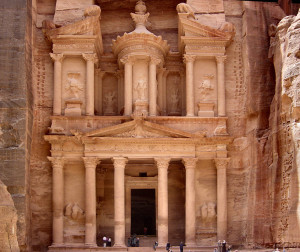“Moses sent messengers…to the king of Edom.” The first three words in the sentence (Numbers, 20:14) appeared earlier in Torah when Jacob prepared to meet with his brother Esau, “Jacob sent messengers…to his brother Esau…in Edom” (Genesis, 32:?). The text in its choice of words in Parshat Hukat takes us back to that earlier conflict between Jacob and Esau, the twin brothers, and brings to light a complicated relationship of brothers-turned-nations of Israel and Edom, indicating, according to Ramban that “the actions of the fathers are a sign for the children.”
In the book of Genesis Jacob sent messengers to Esau hoping to appease his brother following Jacob’s theft of Isaac’s blessing intended for Esau. Jacob chose a one down position of humility toward Esau, “so speaks your servant Jacob.” In Numbers and generations later, Moses chose an almost identical message yet instead of servitude he used a kinship term, “so speaks your brother Israel.” Moses was aware of the emerging complicated relationship and tried to soften his request recounting the hardship of the Israelites in Egypt, the crying out to God, the exodus and now the fact that the nation Israel finds itself on the border of the kingdom of Edom. “Allow us, then, to cross your country.” Moses is asking for permission echoing Jacob’s plea, “Please, if you would do me this favor.” Moses is equally careful, assuring that it would be a limited passage, there will be no trespassing, no walking through fields or vineyards, nor drinking water from wells.
Moses’ efforts are unsuccessful, the king not only refuses permission, he adds a threat, “You shall not pass through us, if you do, we will meet you with the sword.” The messengers try again, “if we or our cattle drink your water, we will pay for it.” The response is, “you shall not pass through,” followed by a show of power, “Edom went out against them in heavy force, strongly armed.”
The king’s show of power recalls Esau’s similar threatening display, coming to meet Jacob accompanied by “four hundred men.” While the meeting of the brothers took an emotional and conciliatory turn, the king of Edom adamantly refused permission to pass through his land and the Israelites made a detour instead.
Should we assume that we really have the definitive version of the encounter between the two nations? Not according to Torah. Deuteronomy Chapter 2 offers yet another and surprising account of the same Israelite travel to the edge of the Kingdom of Edom and a very different version of events.
According this later version Moses never asked the king of Edom permission to pass through his territory. Moses recounts in Deuteronomy that it was God who told him that they could not enter the land of Edom, “God told me…I will not give you of their land so much as a foot can tread on; I have given the country of Seir as a possession to Esau.” According to the book of Deuteronomy Moses never approached the king of Edom and the king was not in a position to relent or refuse. The text states clearly, “we moved away from our kinsmen the descendants of Esau.”
The detour away from Edom connects the two versions yet does not settle the different accounts. One way to approach the different telling of the event is that the book of Numbers’ version reflects Moses’ perspective, and the one in Deuteronomy that declares a clear injunction on entering Edom, expresses God’s view. The two approaches to the relationship between nations underscore the multiple aspects of Torah, which invite a deeper more thoughtful and more nuanced readings of complex events.

Translated from the Hebrew by Ayala Emmett